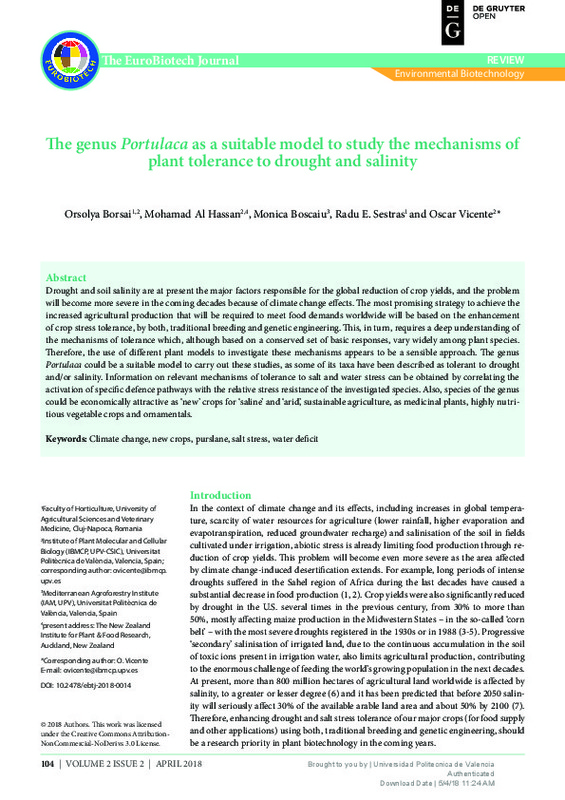JavaScript is disabled for your browser. Some features of this site may not work without it.
Buscar en RiuNet
Listar
Mi cuenta
Estadísticas
Ayuda RiuNet
Admin. UPV
The genus Portulaca as a suitable model to study the mechanisms of plant tolerance to drought and salinity
Mostrar el registro sencillo del ítem
Ficheros en el ítem
| dc.contributor.author | Borsai, Orsolya
|
es_ES |
| dc.contributor.author | Al Hassan, Mohamad
|
es_ES |
| dc.contributor.author | Boscaiu, Monica
|
es_ES |
| dc.contributor.author | Sestras, Radu E.
|
es_ES |
| dc.contributor.author | Vicente, Oscar
|
es_ES |
| dc.date.accessioned | 2019-05-11T20:02:39Z | |
| dc.date.available | 2019-05-11T20:02:39Z | |
| dc.date.issued | 2018 | es_ES |
| dc.identifier.uri | http://hdl.handle.net/10251/120338 | |
| dc.description.abstract | [EN] Drought and soil salinity are at present the major factors responsible for the global reduction of crop yields, and the problem will become more severe in the coming decades because of climate change effects. The most promising strategy to achieve the increased agricultural production that will be required to meet food demands worldwide will be based on the enhancement of crop stress tolerance, by both, traditional breeding and genetic engineering. This, in turn, requires a deep understanding of the mechanisms of tolerance which, although based on a conserved set of basic responses, vary widely among plant species. Therefore, the use of different plant models to investigate these mechanisms appears to be a sensible approach. The genus Portulaca could be a suitable model to carry out these studies, as some of its taxa have been described as tolerant to drought and/or salinity. Information on relevant mechanisms of tolerance to salt and water stress can be obtained by correlating the activation of specific defence pathways with the relative stress resistance of the investigated species. Also, species of the genus could be economically attractive as `new¿ crops for `saline¿ and `arid¿, sustainable agriculture, as medicinal plants, highly nutritious vegetable crops and ornamentals. | es_ES |
| dc.language | Inglés | es_ES |
| dc.publisher | European Biotechnology Thematic Network Association | es_ES |
| dc.relation.ispartof | The Eurobiotech Journal | es_ES |
| dc.rights | Reconocimiento - No comercial - Sin obra derivada (by-nc-nd) | es_ES |
| dc.subject | Climate change | es_ES |
| dc.subject | New crops | es_ES |
| dc.subject | Purslane | es_ES |
| dc.subject | Salt stress | es_ES |
| dc.subject | Water deficit | es_ES |
| dc.subject.classification | BOTANICA | es_ES |
| dc.subject.classification | BIOQUIMICA Y BIOLOGIA MOLECULAR | es_ES |
| dc.title | The genus Portulaca as a suitable model to study the mechanisms of plant tolerance to drought and salinity | es_ES |
| dc.type | Artículo | es_ES |
| dc.identifier.doi | 10.2478/ebtj-2018-0014 | es_ES |
| dc.rights.accessRights | Abierto | es_ES |
| dc.contributor.affiliation | Universitat Politècnica de València. Departamento de Ecosistemas Agroforestales - Departament d'Ecosistemes Agroforestals | es_ES |
| dc.contributor.affiliation | Universitat Politècnica de València. Departamento de Biotecnología - Departament de Biotecnologia | es_ES |
| dc.description.bibliographicCitation | Borsai, O.; Al Hassan, M.; Boscaiu, M.; Sestras, RE.; Vicente, O. (2018). The genus Portulaca as a suitable model to study the mechanisms of plant tolerance to drought and salinity. The Eurobiotech Journal. 2(2):104-113. https://doi.org/10.2478/ebtj-2018-0014 | es_ES |
| dc.description.accrualMethod | S | es_ES |
| dc.relation.publisherversion | http://doi.org/10.2478/ebtj-2018-0014 | es_ES |
| dc.description.upvformatpinicio | 104 | es_ES |
| dc.description.upvformatpfin | 113 | es_ES |
| dc.type.version | info:eu-repo/semantics/publishedVersion | es_ES |
| dc.description.volume | 2 | es_ES |
| dc.description.issue | 2 | es_ES |
| dc.identifier.eissn | 2564-615X | es_ES |
| dc.relation.pasarela | S\361555 | es_ES |








